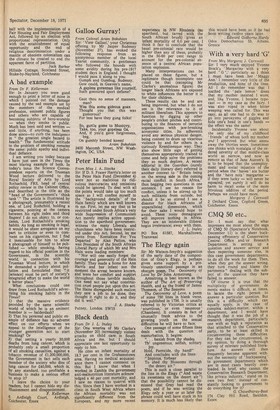A bad example
From Dr F. Kellerman Sir: In January you were good enough to print a letter of mine in which I pointed out the damage caused by the sad example set by the members of the medical profession, eminent public figures and others who are capable of becoming subjects of hero-worship — when they smoke in public. Much has been said and written — and little, if anything, has been done since—to curb the indulgence in " the greatest single hazard to health." The fundamental attitude to the problem of smoking remains the same: public apathy and individual defiance.
I am writing you today because I have just seen in the Times the most blaring example of both. In today's issue the Science Correspondent reports on the Trueman Wood lecture delivered to the Royal Society of Arts by Lord Rothschild, FRS, head of central policy review in the Cabinet Office, and described in the title as the "head of the Government's 'think tank '." The article is illustrated by a photograph, presumably a recent one, of Lord Rothchild, holding a cigarette, pointing at the camera between his right index and third fingers! I do not object to, or condemn, Lord Rothschild's smoking habits. As long as smoking is legal, it would be sheer arrogance on my part to criticise or even to comment on his cigarettes, but I find it inexcusable for him to allow a photograph of himself to be published — while smoking, having regard to his official position in the Government, in the scientific world, in connection with his Trueman Wood lecture, in which he demanded a policy about pollution and formulated that "it [science] must be part of society's integrated effort to make the world a better place." What conclusions could one draw from Lord Rothschild's advertising his smoking habits in the Times?
1) that the massive evidence Provided by the same scientific World of which he is an eminent member is — balderdash?
2) That his personal and public example of defiance has no adverse effect on our efforts when we appeal to the intelligence of the Younger generation not to start smoking? Or 3) that setting a yearly 30,000 deaths from lung cancer, which is Probably only a small proportion of all smoking casualties, against a tobacco revenue of £1,200,000,000, the Government in fact sells each Member of the society who dies of lung cancer for £40,000, which is, by any standard, too profitable a business to make a serious effort to stop it?
I leave the choice to your readers, but I cannot hide my disillusionment and disappointment. F. Kellerman 6 Ardleigh Court, Ardleigh, Colchester, Essex










































 Previous page
Previous page